Healthy Skin And Joints
Your body is a marvel of interconnected systems where healthy skin and joints play crucial roles. Skin, the largest organ, serves as a protective barrier, and is often the first indicator of overall well-being. Joints on the other hand, are the very hinges that allow you to move with grace and agility.
Now, you might not think of your skin and joints as being related, but they are. They’re both structures that require strength and flexibility, and they each face threats from inflammation, aging, and environmental damage. Conditions like psoriasis can manifest in both the skin and joints, revealing this deep connection.
A holistic approach to care is, therefore, imperative. It’s not just about slathering on creams or taking joint supplements; it’s about a comprehensive lifestyle that nurtures both of these areas. As we shift to explore the benefits of collagen, remember it’s a vital piece of this puzzle, supporting the integrity and function of both skin and joints.
The Power of Collagen for Skin and Joint Health
Collagen is a powerhouse protein, the most abundant in your body, acting as the glue that holds everything together. It’s essential for the firmness of your skin, and the function of your joints. As we age, our bodies produce less collagen, leading to wrinkles and joint discomfort. But replenishment through diet or supplements can make a real difference.
When it comes to skin health, collagen is a key player in maintaining elasticity and hydration. It helps skin bounce back from the stretching and contracting it does every day. For joints, collagen contributes to the integrity of cartilage, the rubbery tissue that protects your bones. Less collagen means cartilage may get thinner, making joint movement more painful.
The benefits of collagen are not just hearsay; numerous studies back them up. Researchers have seen visible improvements in skin elasticity and hydration among individuals taking collagen supplements. In the realm of joint health, studies suggest collagen can alleviate joint pain, and possibly even stave off osteoarthritis.

Image by kjpargeter on Freepik
I’m here to help you with making an informed choice about collagen sources. You can opt for supplements, where hydrolyzed collagen is a popular form, as it’s more easily absorbed. Or, choose natural organic sources, such as bone broth or foods rich in amino acids that promote collagen production, like chicken, fish, and egg whites.
Don’t worry too much about immediate results. It’s more about consistent, long-term use. Always prioritize safety and efficacy. If you’re considering collagen supplements, it’s smart to discuss them with your healthcare provider, especially if you have underlying health conditions or take other medications.
Lifestyle Choices for Boosting Collagen and Enhancing Health
If you want to capitalize on the benefits of collagen for your skin and joints, incorporating certain lifestyle choices can make a significant difference. It’s not just about taking supplements; it’s also about nurturing your body with the right foods, activities, and self-care practices.
First on the list is your diet. Eating foods high in vitamin C, like citrus fruits, bell peppers, and leafy greens, can boost your body’s collagen production. Don’t forget about protein-rich foods such as Quinoa, lean meats, legumes, and nuts which provide the amino acids needed to form collagen.
Physical activity is next up. Regular exercise, especially weight-bearing and resistance exercises, can help maintain joint health and promote collagen synthesis. But if you’re dealing with joint pain, swimming, gentle rebounding or water aerobics might be a gentler option while still beneficial. Learn Natural Ways to Heal Inflammation in the Body.
You can’t overlook the importance of staying hydrated and getting enough rest. Water helps to keep your skin plump and joints lubricated, whereas sleep is when your body goes into repair mode, which includes collagen production.
Protecting yourself from extended periods of UV rays and avoiding excessive sugar and refined carbs, which can break down collagen, are key preventative measures. Choose skincare products with collagen-boosting ingredients like retinol and hyaluronic acid to support your skin health regime.
Finally, remember that adjusting your approach is perfectly okay. What works for others may not perfectly suit your unique needs. Monitor your body’s responses, consult with healthcare professionals as needed, and find what truly resonates with you.
Embrace these practices, and you’re likely to see a positive impact not only on your skin and joints but on your overall wellbeing. By making these practical, health-focused choices, you’re investing in a stronger, more vibrant you for the years to come.
